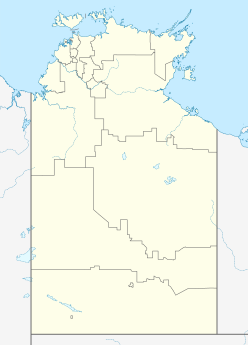Boxhole is a young impact crater located approximately 180 km (265 km by road) north-east of Alice Springs in the Northern Territory, Australia.[1] It is 170 metres in diameter and its age is estimated to be 5,400 ± 1,500 years based on the cosmogenic 14C terrestrial age of the meteorite,[2] placing it in the Holocene. The crater is exposed to the surface.[3]
| Boxhole crater | |
|---|---|
 Boxhole meteorite crater, July 2011 | |
| Impact crater/structure | |
| Confidence | Confirmed |
| Diameter | 170 m (560 ft) |
| Age | 5.4 ± 1.5 ka Holocene |
| Exposed | Yes |
| Drilled | No |
| Location | |
| Coordinates | 22°36′45″S 135°11′43″E / 22.61250°S 135.19528°E |
| Country | Australia |
| State | Northern Territory |
Description
editIn 1937 Joe Webb, a shearer at Boxhole sheep station, took geologist Cecil Madigan to examine the crater. Madigan discovered nickel-bearing metallic fragments and iron shale-balls similar to those found at Henbury to the south of Alice Springs.[4] It was the second impact crater to be described in Australia, after Henbury.[5] A later search found additional meteoritic metal including an iron mass of 181 pounds (82 kg) ,[6][7] now in the Natural History Museum, London.
See also
editReferences
edit- ^ Bevan, Alex; McNamara Ken (1993). Australia's Meteorite Craters. Perth: Western Australian Museum. p. 15. ISBN 0-7309-5926-0.
- ^ Kohman T. P. and Goel P.S. 1963. Terrestrial ages of meteorites from cosmogenic 14C. In: Radioactive Dating, pp. 395–411. International Atomic Energy Agency, Vienna.
- ^ "Boxhole". Earth Impact Database. Planetary and Space Science Centre University of New Brunswick Fredericton. Retrieved 2009-08-19.
- ^ Madigan, C. T., The Boxhole crater and the Huckitta meteorite (central Australia). Royal Society South Australia Transactions and Proceedings, v. 61, pp.187–190. 1937
- ^ Haines P.W. (2005). Impact cratering and distal ejecta: the Australian record. Australian Journal of Earth Sciences, Volume 52, pp. 482 ' History of discovery an dinvestigations' Abstract
- ^ Madigan, C.T. 1940. The Boxhole meteoric iron, central Australia, Mineralogical Magazine 25, 481-486
- ^ Mark, Kathleen (1987). Meteorite Craters. Tucson: The University of Arizona Press. p. 90. ISBN 0-8165-1568-9.
Further reading
edit- Cassidy, W. A., Descriptions and topographic maps of the Wolf Creek and Boxhole craters, Australia (abstract). French, B.M. and Short, N.M., eds., Shock Metamorphism of Natural Materials, Mono Book Corp., Baltimore, MD, p. 623. 1968
- Shoemaker, E. M., Roddy, D.J., Shoemaker, C.S. and Roddy,J.K., The Boxhole meteorite crater, Northern territory, Australia (abstract). Lunar and Planetary Science XIX, pp. 1081–1082. 1988
External links
edit- Particles around Boxhole meteorite crater.Hodge, P. W.; Wright, F. W. (1973). "Meteoritics, Vol 8, No. 4. Dec 31, 1973". Meteoritics. 8 (4). Davos, Switzerland: Meteoritical Society: 315. Bibcode:1973Metic...8..315H. doi:10.1111/j.1945-5100.1973.tb01182.x.
- Natural History Museum (Boxhole Meteorite)[1]
